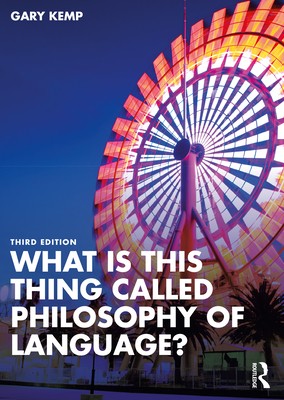
- We will send in 10–14 business days.
- SAVE -10% with code: EXTRA
Reviews
Description
Philosophy of language explores some of the most abstract yet most fundamental questions in philosophy. The ideas of some of the subject's great founding figures, such as Gottlob Frege, Ludwig Wittgenstein and Bertrand Russell, as well as of more recent figures such as Saul Kripke and Hilary Putnam, are central to a great many philosophical debates to this day and are widely studied. In this clear and carefully structured introduction to the subject Gary Kemp explains the following key topics:
- the basic nature of philosophy of language, its concepts, and its historical development
- Frege's theory of sense and reference; Russell's theory of definite descriptions
- Wittgenstein's Tractatus, Ayer, and the Logical Positivists
- Recent perspectives including Kripke, Kaplan and Putnam; arguments concerning necessity, indexicals, rigid designation and natural kinds
- the pragmatics of language, including speech-acts, presupposition and conversational implicature
- Davidson's theory of language, the 'principle of charity', and the indeterminacy of interpretation
- puzzles surrounding the propositional attitudes (sentences which ascribe beliefs to people)
- the challenges presented by the later Wittgenstein
- contemporary directions, including contextualism, fictional objects and the phenomenon of slurs.
The third edition has been thoroughly revised throughout and includes a new chapter on Noam Chomsky's theory of universal grammar. In addition, the concluding chapter on modern directions in philosophy of language has been expanded to two chapters and now cover crucial emergent areas of study such as slurs, conceptual engineering, epistemic injustice and experimental philosophy.
Chapter summaries, annotated further reading and a glossary make What is this thing called Philosophy of Language? an indispensable introduction to those teaching philosophy of language and will be particularly useful for students coming to the subject for the first time.
EXTRA 10 % discount with code: EXTRA
The promotion ends in 20d.14:38:59
The discount code is valid when purchasing from 10 €. Discounts do not stack.
- Author: Gary Kemp
- Publisher: Routledge
- ISBN-10: 1032426543
- ISBN-13: 9781032426549
- Format: 17.4 x 24.6 x 1.8 cm, softcover
- Language: English English
Philosophy of language explores some of the most abstract yet most fundamental questions in philosophy. The ideas of some of the subject's great founding figures, such as Gottlob Frege, Ludwig Wittgenstein and Bertrand Russell, as well as of more recent figures such as Saul Kripke and Hilary Putnam, are central to a great many philosophical debates to this day and are widely studied. In this clear and carefully structured introduction to the subject Gary Kemp explains the following key topics:
- the basic nature of philosophy of language, its concepts, and its historical development
- Frege's theory of sense and reference; Russell's theory of definite descriptions
- Wittgenstein's Tractatus, Ayer, and the Logical Positivists
- Recent perspectives including Kripke, Kaplan and Putnam; arguments concerning necessity, indexicals, rigid designation and natural kinds
- the pragmatics of language, including speech-acts, presupposition and conversational implicature
- Davidson's theory of language, the 'principle of charity', and the indeterminacy of interpretation
- puzzles surrounding the propositional attitudes (sentences which ascribe beliefs to people)
- the challenges presented by the later Wittgenstein
- contemporary directions, including contextualism, fictional objects and the phenomenon of slurs.
The third edition has been thoroughly revised throughout and includes a new chapter on Noam Chomsky's theory of universal grammar. In addition, the concluding chapter on modern directions in philosophy of language has been expanded to two chapters and now cover crucial emergent areas of study such as slurs, conceptual engineering, epistemic injustice and experimental philosophy.
Chapter summaries, annotated further reading and a glossary make What is this thing called Philosophy of Language? an indispensable introduction to those teaching philosophy of language and will be particularly useful for students coming to the subject for the first time.


Reviews